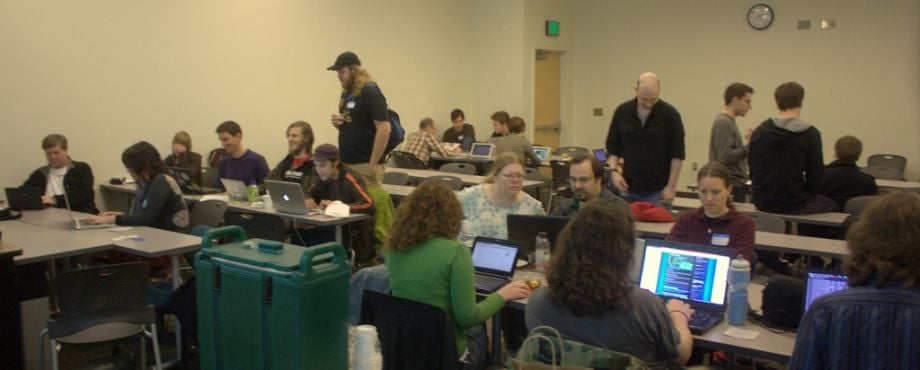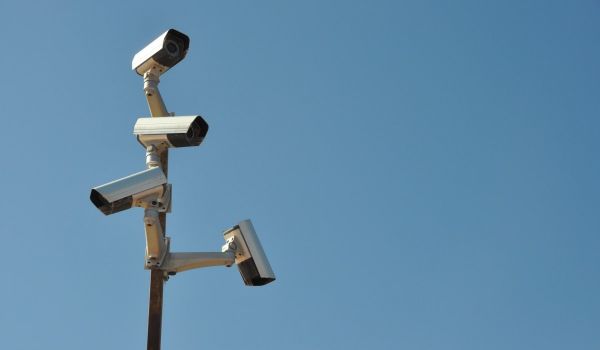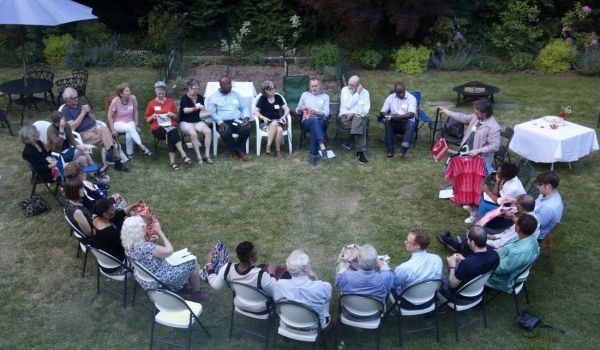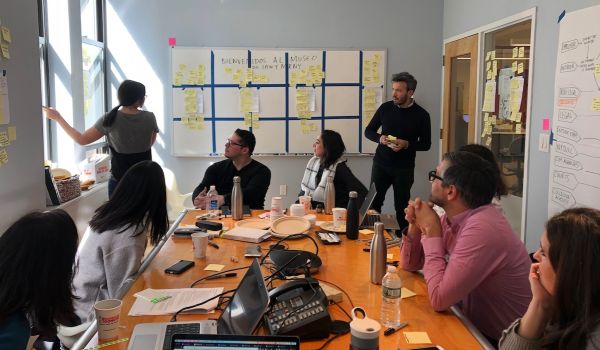When it comes to how civic technology can change the world, the conversation has a way of shifting back and forth between the start-up community and the hacktivists. One can easily have a debate about which technologists are, on balance, accomplishing more to make cities work: The entrepreneurs or the altruists. (And it’s not as if the lines between the two are clear.) Government itself is a third actor in the equation.
After reviewing Smart Cities: Big Data, Civic Hackers and the Quest for a New Utopia, I wanted to follow up on some of these questions with author Anthony Townsend, a research director at the Institute of the Future. Here, Townsend talks about democratizing civic tech, why local governments may be the ideal keepers of personal data, and robot cars.
Next City: There’s a new product, the Smart Citizen, that allows normal people to participate in mass environmental monitoring. Is giving us back this power where Americans can, like de Tocqueville said, just get out there and solve our own problems rather than waiting on government to do it for us?
Townsend: Smart Citizen is just one of a handful of civic hacking projects that are leveraging the platform Arduino to get people engaged in citizen science. Not surprisingly, a lot of these projects relate to urban problems like air quality. Air Quailty Egg is another example. That project is responding to the fact that while ozone pollution varies greatly block by block, most cities — NYC and Paris, I know — only have a dozen ozone monitoring stations.
Technology like this is about people identifying local problems that are shared across communities, taking advantage of democratized technology and open networks, and stepping in to craft and deploy their own solution. It’s not limited to the U.S., but de Tocqueville’s observation that Americans are particularly prone to solve problems this way still applies. It’s one reason that even as the U.S. falls behind in so many other areas, I think we’ve got a real edge in smart urban tech, especially the self-organized grassroots variety.
NC: I couldn’t tell if you were sympathetic to the idea that it’s too bad tech isn’t being used in a more concerned manner — that is, by activists, non-profits — or if you came out on the side that, in the end, all the play is what delivers real good for the world. What’s your take?
Townsend: What I was getting at in the book is that there’s still a lot of play. We need a lot more sustained energy and cohesion and leadership in the civic tech movement for it to have a real long-term impact, and to deliver the innovation potential that is there. Kickstarter projects are a good place to start, but what gets me excited is seeing industrial giants like Intel (disclosure: they are a client of IFTF) embrace Arduino. They see the future in an Internet of Things that people build themselves, and parallels to the PC revolution in the 1970s. That’s a strong signal to me that this movement could reach scale and totally transform the tech and urban landscape a decade or two down the road.
And we need a bigger set of hackers who don’t come from privileged backgrounds. The Digital Stewards Project in Red Hook, Brooklyn, is a great example. The New America Foundation Open Technology Institute is teaching teens in the projects to install and maintain mesh wireless networks. I really think it is the key to a more bottom-up, urban design-driven vision of a smart city — not as a place enabled by big smart infrastructure, but one that accumulates organically from thousands and millions of tiny little installations.
NC: This is something you hear a lot in conversations about tech and start-ups: It’s urban college kids solving the problems of urban college kids. But isn’t that how entrepreneurship works? People solve pain points from their own experience.
Townsend: Yes, you have a point. This technology has not reached all of the innovators it could or should. We need to teach Arduino to high school kids in the Bronx, and not just grad students at New York University.
NC: Programs like ScriptEd? It’s a non-profit, started out of Manhattan, to help kids in less privileged areas not only learn to code but also imagine themselves as being part of the Internet.
Townsend: Sure, those kinds of programs are essential to making sure that the economic benefits of building smart cities are more widespread, and their designs reflect a representative group of citizens. And it’s not just entrepreneurship — when you look at how city apps contests have evolved, they started with people solving their own problems. Now, cities partner with NGOs to define community problems that need solving. Instead of apps for bike routes, you get apps for single mothers trying to find cheap, good day care.
NC: I’m glad you brought up the contests. You made a compelling case, in the book, that they did not deliver nearly so much as the hype might have suggested. Do you think there could be more that comes from civic hackathons if government and funders were to get behind teams willing to really commit to developing and maintaining projects?
Townsend: I think the contest model has probably run its course. What’s happening now is that the contests in many places evolve into accelerator programs, and a number of civic tech incubators pop up to help these people evolve their apps and ideas into social enterprises. Although what I would like to see would be some much larger money, more grand smart city design contests. Like, design a digital wayfinding system for all of Downtown Brooklyn, with someone committed to financing it.
NC: Fair. This leads us nicely into civic data, though. Are there any watchdog groups out there working to make sure that, as governments begin to turn data over to the public, that they aren’t falsifying their data? Such as applying data forensics?
Townsend: I’m not aware of any group that does that across the board. There are certainly issue-specific groups that scrutinize different sets of data, as well as investigative journalists and occasional whistle blowers. Lots of accusations around NYPD CompStat data for instance, which I write about. But I’ve not heard of any city government systematically falsifying. Though the more you rely on data-driven management — and the more mayors start posting detailed, near real-time dashboards of performance data to the web, like L.A.‘s mayor did last week — the more the incentive to do so will be there. It’s probably just a matter of time.
NC: You wrote about a real bleeding-edge idea in the book, relevant to personal data, about the notion that city governments might be the right governments to be the keepers and protectors of our personal data.
Townsend: Yeah, I’m pretty intrigued by it. People have a very different relationship with local government, in many ways more direct and more accountable. A lot of leaders and political scientists use this to argue that cities are really where the opportunity is to take action at this time. And there is a large and growing movement toward developing personal data lockers for individuals versus storing all private data in cloud.
Given that data management is already a big part of what cities do, and a lot of private firms want to come in and wire up cities — largely to get the data — I think there will be a need for cities to assess what’s going on and potentially step in. And that’s just in existing cities retrofitted with smart stuff. In new communities that are wired from the start, they will have to get involved in data management.
NC: There was a way in which you described cities as data protectors could also become a revenue stream for local government. Do you think that that could, potentially, become enough of a revenue stream to really make a difference for a city?
Townsend: Yes, absolutely. Cities could monetize this after deliberating about the pros and cons, just like they do with advertising on bus shelters and so forth.
NC: That could be especially big for places where there is not much of a tax base, but still have economic activity.
Townsend: Interestingly, if I recall, that is where I’ve heard this idea most seriously considered. I can’t recall precisely, but I seem to remember it being bandied about in Detroit
NC: The Robot Car that Drives Itself. Will it happen? Do we need it? Are you excited about it? Or will innovation fly right past four wheeled transport?
Townsend: Robot car is coming. How fast and where is the key question. The Impacts are almost unforeseeable. It could create megasprawl as people watch TV and videoconference on their way to work. It could allow boomers to age in place in the ‘burbs, since they can Uber a ride to the doctor. But it could also have its biggest impact in a place like Manhattan, as commercial vehicles are replaced with self-driving ones. Look at the history of motorization: Impacts were felt first and most heavily here [in New York], when motor vans replaced horses.
Next up: Charles Montgomery’s Happy City: Transforming Our Lives Through Urban Design, due out November 12.
Brady Dale is a writer and comedian based in Brooklyn. His reporting on technology appears regularly on Fortune and Technical.ly Brooklyn.
















